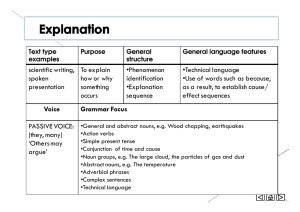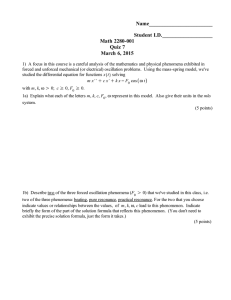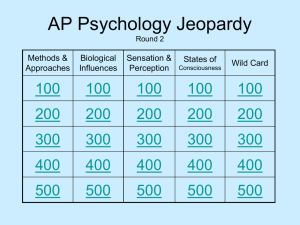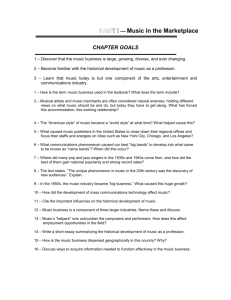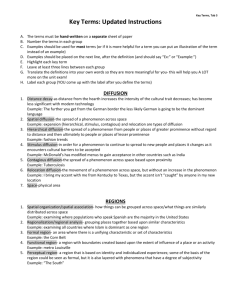Stimuli used in Study 10: item-set A.
advertisement
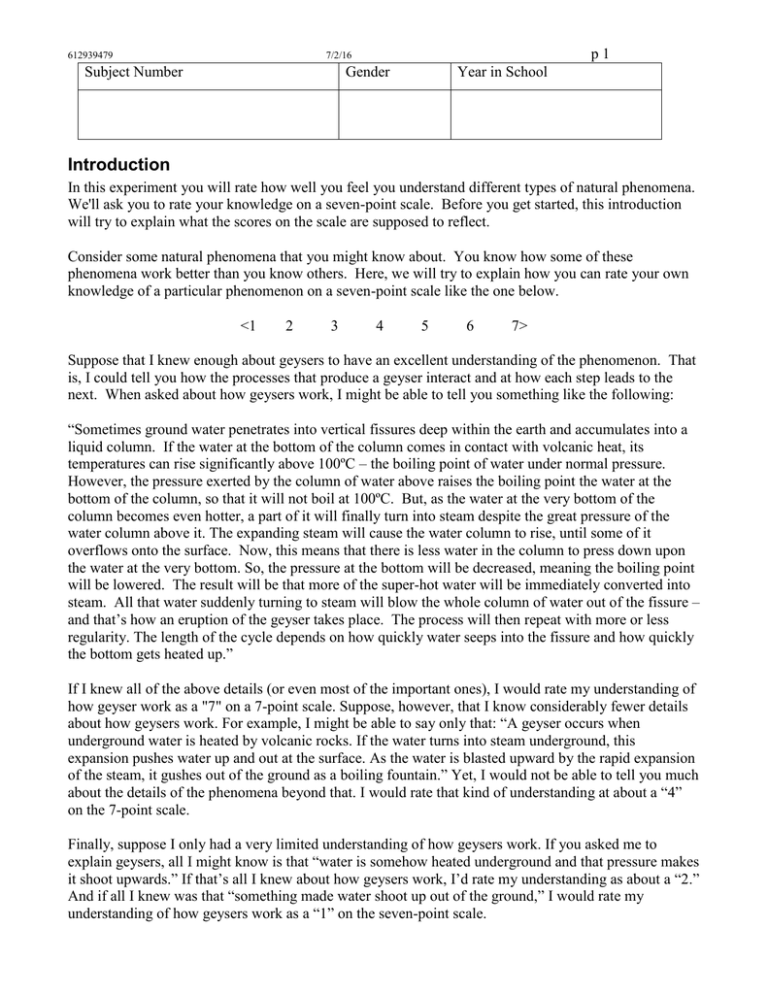
612939479 p1 7/2/16 Subject Number Gender Year in School Introduction In this experiment you will rate how well you feel you understand different types of natural phenomena. We'll ask you to rate your knowledge on a seven-point scale. Before you get started, this introduction will try to explain what the scores on the scale are supposed to reflect. Consider some natural phenomena that you might know about. You know how some of these phenomena work better than you know others. Here, we will try to explain how you can rate your own knowledge of a particular phenomenon on a seven-point scale like the one below. <1 2 3 4 5 6 7> Suppose that I knew enough about geysers to have an excellent understanding of the phenomenon. That is, I could tell you how the processes that produce a geyser interact and at how each step leads to the next. When asked about how geysers work, I might be able to tell you something like the following: “Sometimes ground water penetrates into vertical fissures deep within the earth and accumulates into a liquid column. If the water at the bottom of the column comes in contact with volcanic heat, its temperatures can rise significantly above 100ºC – the boiling point of water under normal pressure. However, the pressure exerted by the column of water above raises the boiling point the water at the bottom of the column, so that it will not boil at 100ºC. But, as the water at the very bottom of the column becomes even hotter, a part of it will finally turn into steam despite the great pressure of the water column above it. The expanding steam will cause the water column to rise, until some of it overflows onto the surface. Now, this means that there is less water in the column to press down upon the water at the very bottom. So, the pressure at the bottom will be decreased, meaning the boiling point will be lowered. The result will be that more of the super-hot water will be immediately converted into steam. All that water suddenly turning to steam will blow the whole column of water out of the fissure – and that’s how an eruption of the geyser takes place. The process will then repeat with more or less regularity. The length of the cycle depends on how quickly water seeps into the fissure and how quickly the bottom gets heated up.” If I knew all of the above details (or even most of the important ones), I would rate my understanding of how geyser work as a "7" on a 7-point scale. Suppose, however, that I know considerably fewer details about how geysers work. For example, I might be able to say only that: “A geyser occurs when underground water is heated by volcanic rocks. If the water turns into steam underground, this expansion pushes water up and out at the surface. As the water is blasted upward by the rapid expansion of the steam, it gushes out of the ground as a boiling fountain.” Yet, I would not be able to tell you much about the details of the phenomena beyond that. I would rate that kind of understanding at about a “4” on the 7-point scale. Finally, suppose I only had a very limited understanding of how geysers work. If you asked me to explain geysers, all I might know is that “water is somehow heated underground and that pressure makes it shoot upwards.” If that’s all I knew about how geysers work, I’d rate my understanding as about a “2.” And if all I knew was that “something made water shoot up out of the ground,” I would rate my understanding of how geysers work as a “1” on the seven-point scale. 612939479 7/2/16 p2 Instructions We are trying to get a sense of how people feel about their knowledge of various phenomena as part of a larger study of how people make sense of the world. We are going to present you with 24 phenomena. For each one we will ask you to rate on a 7-point scale how well you feel you understand the phenomena. The 7-point scale is based on the description above. That is, you should give the item close to a "1" if you feel know very little about the phenomenon, and close to a "7" if you feel you know almost everything important about the phenomenon. Finally, it's very important to give us your first impression. We find that taking too long really hurts people's answers. Please go through the list below and circle the number from 1-7 on the scale next to each natural phenomenon, telling us how well you feel you understand each phenomenon. Remember, “7” means you have a very thorough understanding of a phenomenon, “1” means you have a very vague understanding of the phenomenon. 612939479 7/2/16 Phenomena p3 Scale Why ice floats in water <1 2 3 4 5 6 7> Why the earth is round <1 2 3 4 5 6 7> How thunder forms <1 2 3 4 5 6 7> Why the sky is blue <1 2 3 4 5 6 7> How hurricanes form <1 2 3 4 5 6 7> How cloud-to-ground lightning occurs <1 2 3 4 5 6 7> Why storm clouds are very dark in color <1 2 3 4 5 6 7> Why stars twinkle <1 2 3 4 5 6 7> Why there are seasons <1 2 3 4 5 6 7> Why the moon has phases <1 2 3 4 5 6 7> How the ozone layer prevents some UV rays from reaching the earth <1 2 3 4 5 6 7> Why air bubbles in the water are spherical <1 2 3 4 5 6 7> How snow forms <1 2 3 4 5 6 7> How earthquakes occur <1 2 3 4 5 6 7> How tides occur <1 2 3 4 5 6 7> Why comets have tails <1 2 3 4 5 6 7> How clouds are formed <1 2 3 4 5 6 7> Why sunny days can be colder than cloudy days <1 2 3 4 5 6 7> How rainbows are formed <1 2 3 4 5 6 7> Why bubbles have color <1 2 3 4 5 6 7> Why ice melts faster in water than in air <1 2 3 4 5 6 7> How hail is formed <1 2 3 4 5 6 7> How volcanoes erupt <1 2 3 4 5 6 7> Why frost is produced at night <1 2 3 4 5 6 7> 612939479 7/2/16 p4 Write Explanations Now, we'd like to probe your knowledge in a little more detail on some of the items. For each of the following, please describe all the details you know about the phenomena, going from the first step to the last, and providing the connection between the steps. That is, your explanation should state precisely how each step leads to the next step in one continuous chain from start to finish. In other words, for each phenomenon, try to tell as complete a story as you can, with no gaps. If you find that your story does have gaps (that is, you are not sure how the steps are connected) please write the word “GAP” in your description at that point, and then continue with the rest of your description. Feel free to use labeled diagrams, or flow-charts to get your meaning across. 612939479 7/2/16 p5 Explain why the sky is blue. Now, please rate how well you feel you understand this phenomenon. Why the sky is blue <1 2 3 4 5 6 7> 612939479 7/2/16 p6 Explain why the moon has phases. Now, please rate how well you feel you understand this phenomenon. Why the moon has phases <1 2 3 4 5 6 7> 612939479 7/2/16 p7 Explain why comets have tails. Now, please rate how well you feel you understand this phenomenon. Why comets have tails <1 2 3 4 5 6 7> 612939479 7/2/16 p8 Explain how rainbows are formed. Now, please rate how well you feel you understand this phenomenon. How rainbows are formed <1 2 3 4 5 6 7> 612939479 7/2/16 p9 Explain how clouds are formed. Now, please rate how well you feel you understand this phenomenon. How clouds are formed. <1 2 3 4 5 6 7> 612939479 7/2/16 p 10 Answer Specific Questions In this section, we will probe your knowledge a little further, by asking you to describe specific aspects of the phenomena. Please try to answer each of the questions below in as much detail as you can. Why does the sky change color only during sunset? Now, please rate how well you feel you understand this phenomenon. Why the sky is blue <1 2 3 4 5 6 7> 612939479 p 11 7/2/16 Why does the moon sometimes rise before the sunset and sometimes after the sunset? Now, please rate how well you feel you understand this phenomenon. Why the moon has phases <1 2 3 4 5 6 7> 612939479 7/2/16 p 12 Why does a comet's tail always point away from the sun? Now, please rate how well you feel you understand this phenomenon. Why comets have tails <1 2 3 4 5 6 7> 612939479 7/2/16 p 13 Why do rainbows always have the colors in the same order? Now, please rate how well you feel you understand this phenomenon. How rainbows are formed <1 2 3 4 5 6 7> 612939479 7/2/16 p 14 What makes clouds actually retain their shape rather than just drift apart? Now, please rate how well you feel you understand this phenomenon. How clouds are formed <1 2 3 4 5 6 7> 612939479 7/2/16 p 15 Read Expert Explanations Below you will find the explanations of each phenomenon provided by an expert. Let’s assume that the expert explanations and the diagrams represent Level 7 knowledge. Please read each explanation carefully, and re-rate your initial level of understanding of each explained item (that is, your level of understanding before you read the explanation), and also your current level of understanding of the explained item (that is, how well you feel you understand the phenomenon after you’ve read the explanation). Blue Sky Please read the explanation in folder 1. How well did you understand the phenomenon before you had read the explanation? Why the sky is blue <1 2 3 4 5 6 7> How well do you understand the phenomenon now that you have read the explanation? Why the sky is blue <1 2 3 4 5 6 7> Moon Phases Please read the explanation in folder 4. How well did you understand the phenomenon before you had read the explanation? Why the moon has phases <1 2 3 4 5 6 7> How well do you understand the phenomenon now that you have read the explanation? Why the moon has phases <1 2 3 4 5 6 7> 612939479 7/2/16 p 16 Comet Tails Please read the explanation in folder 3. How well did you understand the phenomenon before you had read the explanation? Why comets have tails <1 2 3 4 5 6 7> How well do you understand the phenomenon now that you have read the explanation? Why comets have tails <1 2 3 4 5 6 7> Rainbows Please read the explanation in folder 4. How well did you understand the phenomenon before you had read the explanation? How rainbows are formed <1 2 3 4 5 6 7> How well do you understand the phenomenon now that you have read the explanation? How rainbows are formed <1 2 3 4 5 6 7> Clouds Please read the explanation in folder 4. How well did you understand the phenomenon before you had read the explanation? How clouds are formed. <1 2 3 4 5 6 7> How well do you understand the phenomenon now that you have read the explanation? How clouds are formed. <1 2 3 4 5 6 7>
